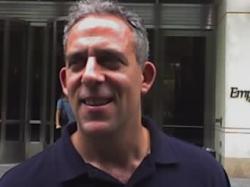My dad, Frank Fiorito, would probably say that. And, yeah, I’ll say it, too. Here’s why.
Growing up in the shadow of my father’s New York Giants Baseball fandom, I’ve known the story of the “Shot Heard ‘Round the World” all my life. It was the home run hit by Bobby Thomson of the New York Giants to beat the Brooklyn Dodgers in the 1951 National League pennant.
In our house, my brother and I had to know a lot of sports facts just to earn a seat at the dinner table. DiMaggio’s streak (a hit in 56 consecutive games), Lawrence Taylor’s single-season most-sacks record (20.5), the man on deck when Bobby Thomson hit that famous homer (Willie Mays), and who served up that homer (Ralph Branca) … just to name a few.
But let’s pause for a moment.
Think about it. “Shot heard round the world.” “The World Series.” What ‘world‘ is that? Americans have long figured ourselves to be at the center of the universe. Who cares what happens elsewhere … if anything at all actually happens anywhere else? And, of course, New Yorkers consider NYC to be at the center of the universe. Heck, nothing could be more New York than the Giants vs. the Dodgers at The Polo Grounds.
But despite the solipsism implied in referring to is as ‘the shot heard round the world,’ there was something beyond baseball that made big news.
It was the first baseball game to be telecast nationally. And it was broadcasted over the Armed Forces Network, too. That meant it was watched in South Korea and wherever else American forces were stationed around the world.
But ‘heard around the world?” Well, yes … sort of. I suspect that very few Germans watched the game in Germany, but I’ll also wager that a lot of American soldiers based in Deutschland saw that historic homer.
While all of this was going on, Brooklyn had signed Jackie Robinson in 1947. He and the country were reeling from ferocious racism that ensued. Yes, America was tilting towards integration (even though segregation wouldn’t end legally until 1958). It was an America in transition–a transition that has yet to be realized.
Looking back, I can imagine my father, Frank Fiorito–at twenty years old–starting his career. He was a computer operator in the age of things to come. The United States, having emerged victoriously in WWII, was experiencing unprecedented economic growth. There was a toaster in every home, automatic washing machines, and fancy cars. My dad had the world in front of him.
He was born in downtown Manhattan–in ‘Little Italy,’ specifically. He was a New York Giants (football and baseball) fan, and that playoff game meant everything to him. The Giants had won 37 of their last 44, which thrust them (unexpectedly) to the pennant.

The Polo Grounds (photo, Ballparks of America)
With the Giants trailing 4-2, the whirlwind came to a climax in the ninth inning of that decisive third game of a three-game playoff. The winner took all, that is, the pennant.
And Thompson’s homer was hit in sacred, hallowed, and holy land–The Polo Grounds. In baseball, the original Polo Grounds was home to the New York (original) Metropolitans (1880-1885) and the New York Giants. But what some people don’t know (and others have forgotten) is that The Polo Grounds was also home for the New York Yankees (1913-1922) and, much later, the New York Mets (1962-63)
And I believe that ‘the shot heard ’round the world’ that day was bigger than Thomson’s three-run homer. Like a thunder strike from heaven, the shot sounded off the changing of the guard in America.
Bobby Thomson was born in Glasgow, Scotland. Like many Americans, he was an immigrant. ‘The Staten Island Scot’ (as he was called), was two years old when his family came to the United States. In 1944, Thomson joined the United States Army Airforce and served as a bombardier. Likewise, Robinson and Branca represented the future of America.
Jackie Robinson would have an exceptional 10-year MLB career. He was the recipient of the inaugural MLB Rookie of the Year Award (1947), was an All-Star for six consecutive seasons (1949-1954), and won the National League Most Valuable Player Award (1949)—the first black player to be so honored. Robinson played in six World Series, including the Dodgers’ 1955 World Series championship.
On Opening Day in 1947—Jackie Robinson’s major league debut—Ralph Branca lined up on the field beside Robinson, but other players refused to follow suit. Branca’s father was a trolley car conductor from Italy. His mother, who was Jewish, immigrated to the United States (1901) from Sandorf, Hungary. His uncle Jozsef Berger was killed at a concentration camp, and maternal aunt Irma died at Auschwitz (1942).
Robinson’s courage, use of nonviolence, and amazing talent contributed to the end of segregation. His perseverance and strength would serve as a mighty example for the civil rights movement.
Yes, we can mock the ‘shot heard round the world” and the ignorance and innocence it implied. While America could pretend to be pure in 1951, America would confront its holiness in the years to come.
“Where have you gone Joe DiMaggio, Our nation turns its lonely eyes to you.”
The fact is, we still hear the echo of ‘the shot heard ’round the world.’ Don’t we?














